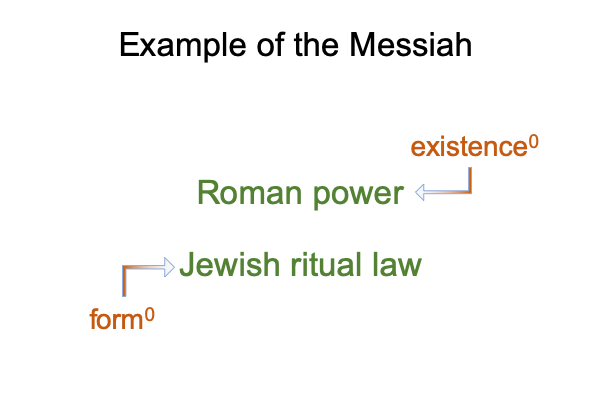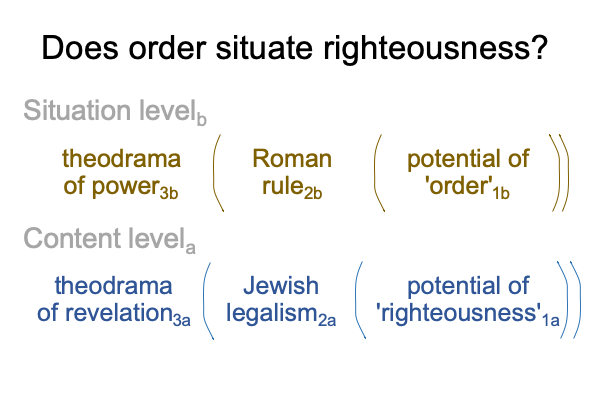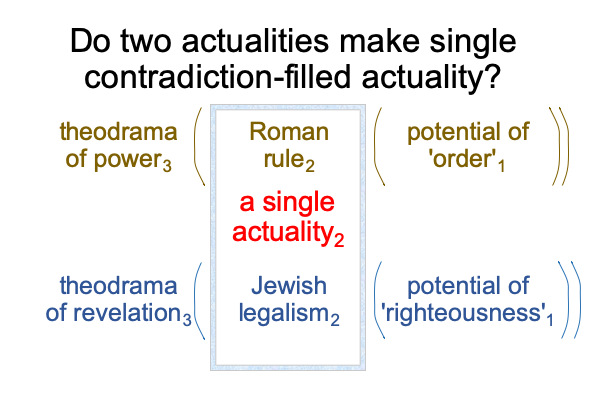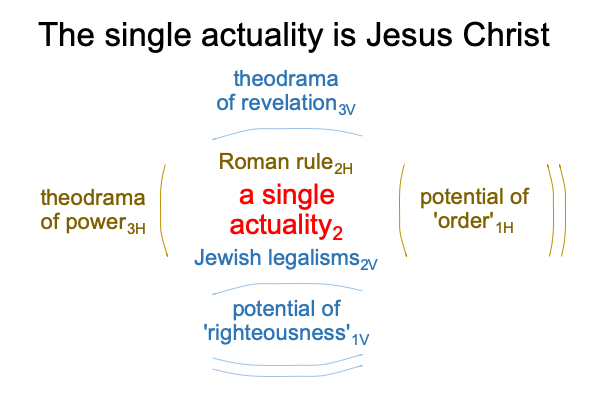0065 Now, I proceed from monsters to mysteries.
Many Jungian commentators of the Matrix movies say that the hero, named “Neo”, is a Christ-like figure.
Is the comparison appropriate?
If it is, then Jesus gives substance to twin monsters through a human sacrifice. In doing so, he humanizes them.
0066 What are the monsters?
The Roman empire is like the machine world.
The fixation of the Jewish law into ritual is like the matrix.
Here is a picture.

0067 Every monster is an actuality2. Every monster is an ill-proportioned thing. Esse_ce and essence are out of balance. That tells us something. It produces phantasms that serve as warnings.
0068 Remember the minotaur?
Do you have some money to invest?
Most investors have met a minotaur. He is someone so bullish that it makes him dangerous. He survives in a labyrith of rules, conditions, and documentation filled with fine print. Once your money is in, it cannot come out of the investment. The financial minotaur is completely confident. He is fully capable of losing your investment.
0069 Longenecker may talk about monsters like the minotaur.
0070 Perhaps, he will talk about the most horrifying monstrosities. These monsters lack substance. Such is the case for the monsters of Roman power and Jewish ritual law.
Roman power is like esse_ce without substance. Rome serves the order that it imposes. Sure, Romans pay tribute to their gods. But, their gods did not order them to construct an empire. Roman power survives because trade flourishes under its rule. Romans place tariffs on trade. Romans rule foreign subjects and tax their wealth. Romans take slaves and sell them at their markets. How does this serve Jupiter?
Jewish ritual law is like essence without substance. Self-described scholars examine the Pentateuch for legal proscriptions. By the time of Christ, scholars accrue lists with hundreds of regulations. There is no way that a Jew could fulfill all these proscriptions correctly. Of course, wealth provides options. One can hire a scholar to manage one’s divine legalities for a reasonable fee.
That fee, of course, is unreasonable for the common person.
0071 Roman power is existential, existence0.
Jewish legalisms are formalisms, form0.
0072 Is there a relation between these two monsters?
At first, it seems that Roman rule2b situates Jewish legalism2a. Standard histories of first-century Palestine make this assumption. These histories try to establish what happened. They propose material and instrumental reasons for conditions and parameters.
In the context of modern history, the following sensible two-level interscope applies. The following configuration is one answer to the question, what does this mean to me3b. That answer is proximate. It addresses the esse_ce, not the essenceof history.

0073 There are other answers. After all, history does not reduce to conditions and parameters. Is there an essence to history?
These are the answers – or perhaps, the questions – that Longenecker addresses.
In the context of what it ultimately means to me3b, Roman law2 does not situate Jewish legalism2. One monster cannot honestly situate the other, because something is missing on a higher level. Rome does not have righteousness and Jerusalem cannot impose order. What brings them into relation?
0074 The passion of Christ, depicted in the four gospels, is masterful. It reads like a fantasy. It reads like a historical document. The four gospels embody and transcend myth.
Both Roman rule2 and Jewish legalisms2 play out in the contradiction-filled theological and political arenas of first century Jerusalem. Jerusalem is a provincial capital for Rome. Jerusalem is the center of message, meaning and presencefor the Jews.
0075 Two monsters occupy Jerusalem. Each accommodates and resists the other. Neither wants to see anyone like Jesus. Jesus appears to threaten Roman order. That is easy to accomplish. Gathering a crowd will do. Crowds intimidate the lion. Also, Jesus obviously undermines the letters of Jewish legalities. He upsets the sheep. He insists that the Jewish Law has a substance, a moral and theological vision.
0076 Monsters do not necessarily create mysteries. No, monsters are drawn into mysteries.
One way to appreciate how Jesus unites both Roman rule2 and Jewish legalism2 is found in a permutation of the previous diagram.

0077 In the life and passion of Jesus Christ, Roman rule2 and Jewish legalism2, one monster filled with esse_ce and the other full of essence, are drawn into a single actuality2. For this moment in history, two monsters coalesce. This is the type of event that eventually leads to myths. It happens right before the eyes of the disciples.
0078 What is this single actuality2?
If Roman rule2 does not honestly situate Jewish legalism2, or visa versa, then they cannot align. Their normal contexts3are mutually exclusive. They may accommodate one another. But, in the encounter with Jesus, they coalesce, forming a single actuality that resists Jesus.
This is the way of theodrama3. The essence of history is theodramatic.
The theodrama of power3 appears independent of the theodrama of revelation3. Until, of course, they are not. They are never independent in the eyes of God. They are never independent in the presence of God.
0079 Intersections are mysteries. Intersections are described in the chapter on message in How To Define the Word “Religion”.
Here is a picture of the intersection.

0080 Indeed, before the eyes of the disciples, Roman law2 and Jewish legalism2 coalesce into one intersection, one mystery.
What is the single actuality that labels this intersection?
The most appropriate label is the name of Jesus Christ, who rises from the dead to defy Roman rule2 and who offers a pathway to the Father in defiance of Jewish legalism2.
0081 In mythic terms, Jesus tames two monsters. The lion lies with the lamb. The power of the state and the legalism of religious institutions come into conflict, but that conflict is contained within the object that brings us all into relation, Jesus Christ.Without Jesus, two monsters are set loose upon the world.
